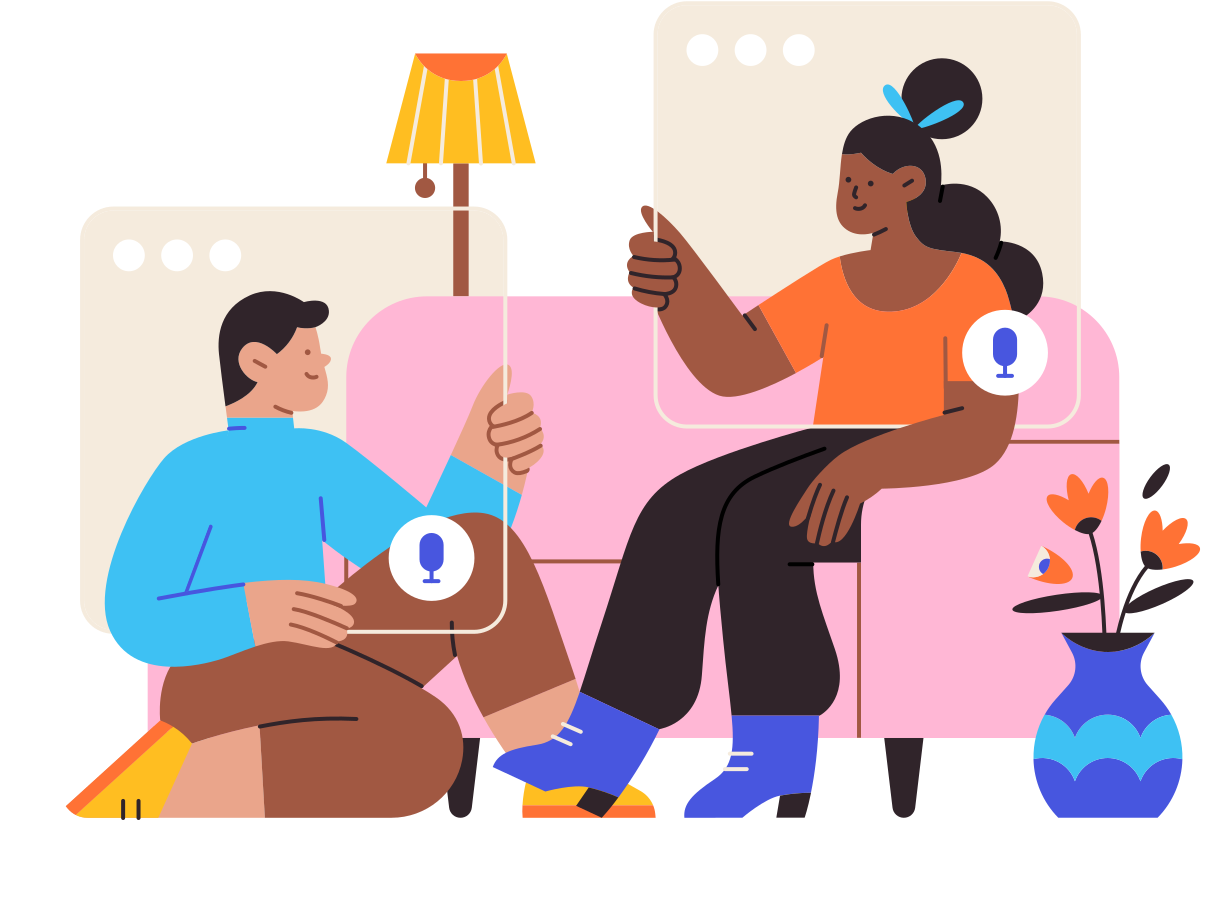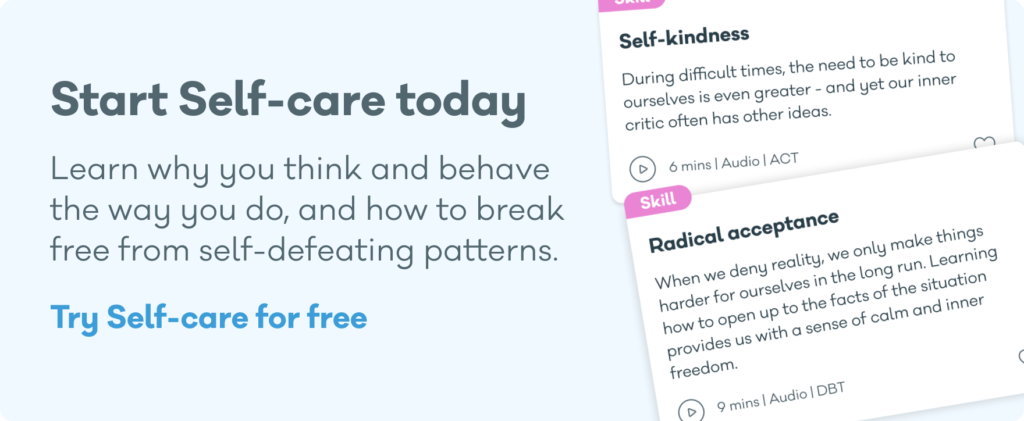If a friend or relative has an eating disorder, such as anorexia, bulimia or binge eating disorder, you probably want to do everything in your power to help. We get it. It can be heartbreaking to watch a loved one struggle with food.
You might be up all night worrying about them, tensions may be frayed because of their rapid mood swings, or perhaps you just feel a little angry or frustrated at the situation. And that’s completely understandable.
It can be a very difficult and scary time. But, even if you feel helpless, you should know that there are plenty of ways you can support them on their recovery journey.
You’re already doing such a great job. Just by learning more about eating disorders, you’re showing that you’re willing to put in the legwork and be there for them, every step of the way.
You’re already doing such a great job. Just by learning more about eating disorders, you’re showing that you’re willing to put in the legwork and be there for them, every step of the way.
Given that this week is Eating Disorder Awareness Week (1-7 March), we’re doing our bit to help too.
Here is some practical advice on how you can support your loved one through their recovery journey:
How to support someone with an eating disorder
Arguably the most important piece of advice we can give you is to encourage your loved one to seek treatment as quickly as possible.
This can be one of the most difficult steps for someone living with an eating disorder. But it’s vital because it will ensure their best odds of recovery.
Besides this, there are plenty of ways that you can help make recovery that little bit easier. This may include anything from going to the supermarket with your loved one, supporting them during mealtimes or simply listening to them without judgement or shame.
Every person is different. There isn’t a one-size-fits-all approach to tackling eating disorders.
And, ultimately, as much as you might want to carry this burden for your loved one, only they can do the work.
Having a strong support system around them can make things a whole lot easier though. So, with this in mind, here are just a few ways you can support your loved one:
Educate yourself about eating disorders
From anorexia and bulimia to binge eating, there is a whole host of eating disorders out there, each with its own unique set of symptoms. Not everyone will experience the exact same symptoms, respond the same way to treatment or take the same amount of time to recover. Because eating disorders are as unique as the people suffering from them.
Having an eating disorder can be an incredibly isolating experience because you may feel like no one truly understands or ‘gets’ what you’re going through. That’s why it’s vital that you’re educated on the subject.
Typically:
- Someone with Anorexia Nervosa tends to see themselves as overweight, even if they are dangerously underweight.
- People with Bulimia Nervosa tend to go through recurrent and frequent episodes of eating large amounts of food, and then try to compensate for the possible weight gain with unhealthy behaviours (e.g. such as self-induced vomiting or misuse of laxatives)
- People with Binge-eating disorder tend to feel compelled to overeat and frequently eat until they are uncomfortably full.
For more information, you might find it useful to join a support group or you could reach out to an eating disorder charity such as Beat.
Avoid blame
Eating orders are so complex, and there’s no bonafide reason why they develop. A whole host of different factors, including someone’s genetics, biology, and early life experiences, can combine to make it more likely that someone may develop an eating disorder.
But your loved one may not see it that way. They may believe that they caused their eating disorder or that it’s ‘their fault’. Perhaps they think that they are ‘weak’ or that they simply ‘brought it upon themselves’. Not only is this sort of thinking untrue, but it can also be a heavy burden to carry.
Shame and blame can play no part in recovery. If anything, it’ll probably hold them back. With this in mind, it’s important that you remind them that they’re not to blame. They didn’t ‘choose’ to have an eating disorder and recovery isn’t as simple as ‘just eating’.
On the flip side, you may want to assume responsibility for their disordered eating, particularly if you’re a parent. You may feel like you should’ve noticed the signs sooner. But the reality is you’re not to blame either so don’t be hard on yourself. Focus your attention on the here and now.
Keep socialising
People with eating disorders can become withdrawn and distant and, unsurprisingly this can exacerbate harmful thoughts or low self-esteem.
Even if your loved one becomes more reserved, encourage them to socialise. Invite them to join in on group activities and social events that don’t revolve around food or exercise e.g. a craft evening or an online quiz.

Build up their self-esteem
Low self-esteem and eating disorders often go hand-in-hand. But feelings of low-self worth can be a difficult roadblock in eating disorder recovery.
That’s why it’s important to build up their self-esteem. Perhaps you could remind them of what a great person they are and how much you appreciate them in your life. Just remember to be specific and genuine in your praise.
Support them during mealtimes
Mealtimes can be a big stressor for people with eating disorders. But there are things you can do to make mealtimes go smoothly.
- Keep the conversation neutral. The kitchen table isn’t the place to talk about stressful issues. Avoid topics such as diet, exercise or how the treatment is going. Instead focus on lighthearted topics like movies, music or positive experiences.
- Make a plan. If mealtimes are an anxious time, careful planning may help to alleviate some worries. As part of treatment, your loved one may have to face ‘fear foods’ or foods that they’ve avoided for a long time. So careful planning can make this step seem less scary. If you’re dining together, plan what you’ll be eating, who will be there, when the mealtime will be and discuss portion sizing. Ensure you have all the ingredients you need to avoid any last-minute swaps too.
- Help with grocery shopping. Grocery shopping can seem like a Herculean task if you’re struggling with an eating disorder. Your loved one may be anxious about things such as nutritional labels or the abundance of food on the shelves. So offering a helping hand could mean the world to them. For instance, you could offer to do their shopping on their behalf, offer to, go together or help them write a shopping list. Online grocery shopping may also be helpful for some people.
Be compassionate during times of conflict
Eating disorders are a difficult beast. You may find that it makes your loved one behave in ways that are completely out of character — and it makes sense.
Mood swings, as well as symptoms of anxiety, depression, perfectionism and impulsivity, are common amongst people with eating disorders, and these may be exacerbated by hormonal imbalances or nutrient deficiencies.
Emotional or aggressive outbursts aren’t uncommon, especially when the person feels challenged. It’s reasonable if you feel hurt or angry. But just remember that this isn’t them, but the eating disorder talking.
When emotions are running high, here are some things you can do to try and de-escalate the situation:
- In some instances, it may be best to walk away and talk things through once everyone has cooled down.
- Even though you may feel emotional, try to resist the urge to get angry or snap at them. It’s completely understandable if you’re exasperated, but don’t express that in front of your loved one as it will only push them away.
- If you lose your nerve, show yourself some compassion and try not to feel too guilty. Once you’ve calmed down, explain your emotions and encourage them to follow suit. Clearly communicating your views may make it easier for you both to prevent the situation from happening again.
Look after yourself
When you’re worried or caring for someone else, it’s easy to let your needs fall by the wayside. However, if you continue down this path, you may start to feel overwhelmed, resentful and even burned out. That’s why it’s important to look after yourself and practice self-care.
It’s not selfish to look after yourself. If anything, it’ll give you the energy you need to help support your loved one on their recovery journey.
Self-care is a vital part of the recovery process too, so you could even get your loved one involved. From practising deep breathing to meditation, there are plenty of mindful activities you could do together.
If it seems novel and you don’t know where to start, you may find it useful to check out Self-care, our audio and video therapy library. It’s full of real-life exercises and therapy techniques to help you unwind your mind and tune into your feelings.
Talking to someone with an eating disorder
When watching someone battle an eating disorder, it can be difficult to know what to say. You don’t want to trigger them or put your foot in it. But, at the same time, you want to let them know that you love and care for them. If you’re struggling to find the words to say, here are a few tips to get you started.
Listen
Talking about the problem is vital, but it’s equally, if not more important, that you listen. Don’t make assumptions or try to interpret what their eating disorder means without hearing what they have to say first.
Let them explain what they’re going through. Because if they feel like you’re not listening, it may discourage them from sharing their difficulties in the future.
Start with “I” statements
There’s so much shame and guilt surrounding eating disorders, so try to avoid making statements that could come across as critical, accusatory or dismissive. That’s where ‘I’ statements can be really useful.
They allow you to express your worries and fears, without pinning the blame on them. For instance, you might say something along the lines of “I’m worried because you don’t seem happy” or “I’ve noticed that you’ve been making some negative comments about your weight lately”.
Focus on feelings first
It’s easy to get caught up on the eating habits, the fear foods and the recovery process. But asking how the person is feeling, is often more productive than talking about food.
That’s because it gives them the opportunity to talk about the deep-rooted emotions behind the eating disorder, without making them feel like their eating habits are being scrutinised. They may bring up the stressors that are triggering their unhelpful eating habits, which could provide an avenue to discuss therapy.
While unhealthy eating behaviour is a big part of it, eating disorders are about much more than food. More often than not, they’re often about coping with volatile emotions or gaining control.
In fact many psychology clinics have reported an alarming uptick in eating disorders in the wake of the Covid pandemic. As such, talking about how your loved one is feeling is such a crucial step.

Don’t comment on their appearance
You might have the best intentions in the world, but avoid commenting on your loved one’s appearance. Even seemingly positive compliments could do more harm than good.
Let’s take the innocent praise “You look so healthy!”. Believe it or not, even this could be taken the wrong way. If it seems irrational that’s because it is. Eating disorders breed irrational thoughts and behaviour. And, to an underweight person who is suffering from anorexia nervosa, they may equate ‘healthy’ with gaining weight — something which they may greatly fear.
Instead try to build up their confidence by complimenting their traits, their morals and their character.
Many people with eating disorders note how they feel like their illness ‘defines them’ — that it’s a filter through which they see themselves and the world.
But the reality is they’re much more than their eating disorder — so remind them of this. Let them know what an incredible, multidimensional person they are, and what they mean to you.
Support and reassure them
It’s easy to list off what you shouldn’t say. But what can you say to show your loved one that you care? The answer in some ways is quite simple: respond with reassurance and love.
People who are struggling with an eating disorder often have a harsh inner critic, a constant inner commentary of criticism and disordered thinking. Discrediting and rationalising these thoughts can be tricky. But you could really help.
Here are some phrases you may find useful:
- “I know it’s difficult, but I’m proud of you.”
- “I believe in you.”
- “I might not understand, but if you need someone to talk to, I will help as much as I can.”
- “How can I help you during this time?”
- “I love you and care about you.”
Encourage them to get professional help.
Eating disorders are challenging illnesses so you won’t have all the answers — and that’s okay. There are plenty of professionals who have the expertise and experience to help.
Beyond anything else, if you know someone who is struggling with this destructive illness the best thing you can do is encourage them to speak to a mental health professional.
Eating disorders are serious illnesses. They have the highest mortality rate among psychiatric disorders. So it’s vital that they seek help as soon as possible as it will ensure their best chance of a speedy recovery.
Remind your loved one that there’s no shame in asking for help. It’s a really brave step, and it can be scary, but the pros will always outweigh the cons.
Their first port of call should be their GP. They’ll walk them through a recovery plan and may also give a diagnosis.
Depending on the type of eating disorder and the severity of the illness, this treatment may involve going to therapy and trying talking therapies such as Cognitive Behavioural Therapy (CBT), or admission to a hospital or a clinic.
Whatever roadmap is laid before them, remind your loved one that you’re there for them and that you’ll guide them through it every step of the way.

